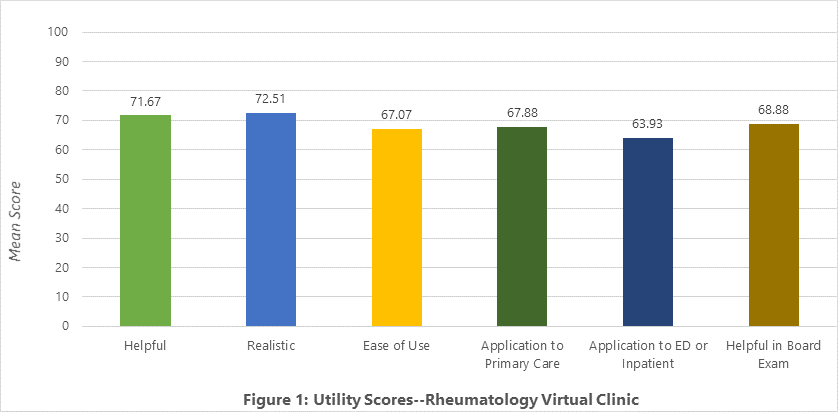Session Information
Date: Sunday, November 5, 2017
Title: Education Poster
Session Type: ACR Poster Session A
Session Time: 9:00AM-11:00AM
Background/Purpose: At our mid-sized community hospital, internal medicine residents have little routine access to subspecialty rheumatology faculty clinical and didactic teaching, which has been reflected in below-average in-training exam scores in recent years. We needed an active learning resource to disseminate practical aspects of rheumatologic diagnoses and management. Hence, we partnered with the University of Rochester, and collaborated to further develop the ‘Virtual Rheumatology Clinic’ Tool. University residents had found the online tool as an engaging, interactive and user friendly series of virtual patients, which we felt would benefit residents and students at Rochester General. Our primary outcome was to improve confidence in diagnosis and treatment of rheumatologic conditions. Our secondary outcomes were to improve knowledge base in rheumatology and obtain user feedback for these modules.
Methods: We had a total of 58 participants (19 PGY 1, 20 PGY 2, 19 students) using the tool. Login instructions were sent via email. 6 modules (lupus, lower back pain, gout, myositis, giant cell arteritis and osteoporosis) were completed over 3 months. Knowledge was assessed by a pretest and posttest covering a broad range of rheumatology topics. Confidence and usefulness of the tool was determined by pre and post surveys. Data was analyzed by T test and Chi square test.
Results: Self-reported confidence in diagnosis and treatment of rheumatologic diseases was below average to average among students and residents before using the modules (P=0.560). Students gained more confidence compared to residents after completing the modules (P=0.04). There was no difference in pretest and posttest scores across the board (P=0.08). Improvement was greater in those concepts covered by the modules compared to those which were not (P=0.001), Residents had a greater mean increase in scores compared to students (P=0.001). Perceived usefulness of modules is shown in Figure 1.
Conclusion: The modules seem to be more appropriate for residents than students, based on overall improvement in objective test scores. Students and residents both acknowledged the usefulness of the modules. Improvement in global post-tests were not detected, likely in part because these were not limited to topics covered; sub scores on covered diagnoses did improve. Our future goals would be to expand the range of topics covered to include rheumatoid arthritis and psoriatic arthritis, expand access to other trainee groups such as family medicine residents and compare utility among groups, and compare the in-training exam scores for cohorts who used this tool to historic cohorts.
To cite this abstract in AMA style:
Kiwalkar S, Marston BA. Utility of a Virtual Rheumatology Clinic for Community Based Internal Medicine Residency Program [abstract]. Arthritis Rheumatol. 2017; 69 (suppl 10). https://acrabstracts.org/abstract/utility-of-a-virtual-rheumatology-clinic-for-community-based-internal-medicine-residency-program/. Accessed .« Back to 2017 ACR/ARHP Annual Meeting
ACR Meeting Abstracts - https://acrabstracts.org/abstract/utility-of-a-virtual-rheumatology-clinic-for-community-based-internal-medicine-residency-program/

